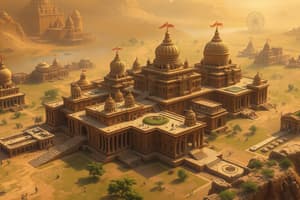Podcast
Questions and Answers
The script of the Indus Valley Civilization has been deciphered.
The script of the Indus Valley Civilization has been deciphered.
False (B)
The cultural practices of the Indus Valley Civilization, such as burial customs and religious beliefs, are well understood.
The cultural practices of the Indus Valley Civilization, such as burial customs and religious beliefs, are well understood.
False (B)
The cities of the Indus Valley Civilization were not advanced in their urban planning and architecture.
The cities of the Indus Valley Civilization were not advanced in their urban planning and architecture.
False (B)
The Indus Valley Civilization's script and cultural practices are well-understood by scholars.
The Indus Valley Civilization's script and cultural practices are well-understood by scholars.
The Indus Valley Civilization's cities were not mysterious.
The Indus Valley Civilization's cities were not mysterious.
The Indus Valley Civilization thrived between 3300 BCE and 1300 BCE.
The Indus Valley Civilization thrived between 3300 BCE and 1300 BCE.
Only two major cities, Harappa and Mohenjo-daro, have been discovered from the Indus Valley Civilization.
Only two major cities, Harappa and Mohenjo-daro, have been discovered from the Indus Valley Civilization.
The urban planning of Harappa and Mohenjo-daro featured streets laid out in a grid pattern and drainage systems.
The urban planning of Harappa and Mohenjo-daro featured streets laid out in a grid pattern and drainage systems.
All buildings in the Indus Valley Civilization cities were constructed using standardized bricks.
All buildings in the Indus Valley Civilization cities were constructed using standardized bricks.
The Grand Bath at Mohenjo-daro and the Great Bath at Harappa are examples of impressive public structures.
The Grand Bath at Mohenjo-daro and the Great Bath at Harappa are examples of impressive public structures.
The Indus Valley Civilization cities lacked any form of centralized authority or social organization.
The Indus Valley Civilization cities lacked any form of centralized authority or social organization.
Study Notes
Mysterious Cities of the Indus Valley Civilization
Introduction
The Indus Valley Civilization, which thrived between 3300 BCE and 1300 BCE, is renowned for its advanced urban planning and architectural achievements. Four major cities, Harappa, Mohenjo-daro, Kalibangan, and Lothal, have been discovered and extensively studied, providing valuable insights into the society and culture of this ancient civilization. Despite extensive research, however, several aspects of these cities remain shrouded in mystery.
Urban Planning
One of the most intriguing aspects of the Indus Valley Civilization is its sophisticated urban planning. The layouts of Harappa and Mohenjo-daro reveal an incredible understanding of city design, with streets laid out in a grid pattern, drainage systems to maintain a clean environment, and communal baths and wells. These features suggest a high level of organization and social cooperation.
Architecture
The architecture of the Indus Valley Civilization cities is another area of fascination. Many structures were built using fired bricks and mortar. One notable feature is the standardized size of the bricks used in different buildings, suggesting a central authority controlling construction standards. The Grand Bath at Mohenjo-daro and the Great Bath at Harappa are examples of impressive public structures.
Script and Writing
Despite the existence of sealed inscriptions and artifacts bearing symbols, the script of the Indus Valley Civilization remains undeciphered. This lack of understanding contributes significantly to the mysteries surrounding the civilization.
Cultural Practices
Cultural practices such as burial customs and religious beliefs are still largely unknown. For instance, cremation and secondary burials are documented, but whether they were part of a specific ritual or symbolism is unsolved.
In conclusion, the mysterious cities of the Indus Valley Civilization continue to captivate scholars due to their advanced urban planning, unique architecture, unreadable script, and enigmatic cultural practices. Further research and technological advancements may eventually shed light on these remaining mysteries.
Studying That Suits You
Use AI to generate personalized quizzes and flashcards to suit your learning preferences.
Description
Explore the enigmatic aspects of the Indus Valley Civilization through its advanced urban planning, architectural wonders, undeciphered script, and mysterious cultural practices. Delve into the mysteries that continue to intrigue scholars and uncover the secrets of this ancient civilization.




